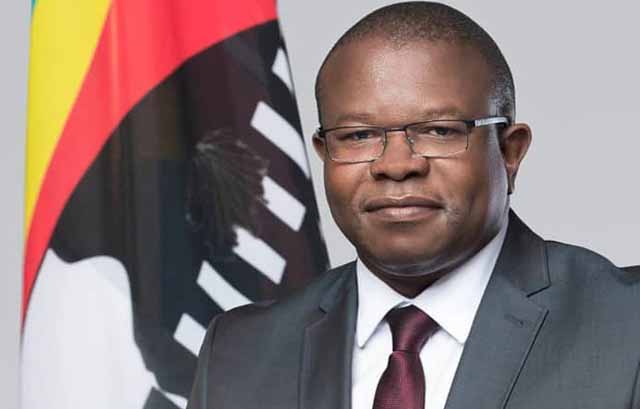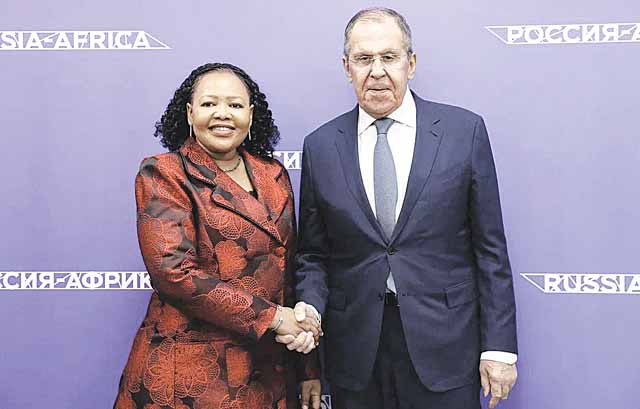By SIBUSISO DLAMINI | 2024-12-15

Minister of Commerce, Industry and Trade Minister Manqoba Khumalo, has categorically dismissed allegations that the country’s Special Economic Zones (SEZs) are being used for illicit financial flows, including money laundering and the financing of terrorism.
Khumalo said the claims of misuse of SEZ’s are baseless and assured the public that government has stringent controls in place to prevent financial improprieties.
“It is misleading that SEZs are facilitating illicit financial flows,” said the minister, emphasising that proper mechanisms, checks and controls are in place to ensure due diligence before granting SEZ licences.
“Financial surveillance continues throughout the operational phases of companies,” he added, in an interview responding to concerns over allegations published in an investigative piece by the International Consortium of Investigative Journalists (ICIJ).
The article claims that SEZs in the country have been exploited as conduits for suspicious financial transactions, connecting the country to illicit gold smuggling and money laundering operations stretching across Southern Africa and beyond.
The SEZ initiative, spearheaded by His Majesty King Mswati III, was introduced through the SEZ Act of 2018 with the intention to drive economic growth by attracting investment, creating jobs, and promoting technological development.
Key incentives for investors include exemptions from corporate tax, foreign exchange controls, and provisions for the unrestricted repatriation of profits.
The ICIJ article, based on leaked documents from the Eswatini Financial Intelligence Unit (EFIU), raised concerns about the country’s regulatory mechanisms and its role in a larger scheme involving questionable financial practices.
According to Khumalo, the allegations of SEZ misuse stemmed, in part, from misunderstandings about certain projects that did not materialise as planned.
“The report for instance, highlighted concerns about gold refining companies allegedly exploiting the SEZ’s favourable terms, but the truth is that only one gold refinery project was licensed,” said the minister.
“Its eventual grounding was due to logistical and security challenges, including the closure of the Matsapha Airport to civilian air traffic,” he added.
Khumalo said only five licences have been issued since the programme’s inception, explaining that none of the companies under these licences are currently operational, because of what he described as significant obstacles to progress.
Impact
Asked about the impact of the programme so far, the minister said it is too early to measure it, especially through its impact on GDP growth or job creation, but expressed confidence that, in time, the initiative would achieve its goals.
“Government is doing everything possible to encourage and assist companies in expediting the process of establishing their factories,” he assured, emphasising his confidence that the review of the SEZ Act of 2018 would address identified gaps and ensure alignment with international standards.
This process, he said, includes the development of regulations to guide the programme’s implementation and ensure adherence to best practices.
The review of the legislation comes after the Export Processing Zones Authority (EPZA) from Taiwan conducted a diagnostic review of the country’s SEZ legislation, and highlighted that critical reforms are required to attract investment and stimulate economic growth.
The assessment, conducted under an intergovernmental cooperation agreement, was presented by International Integrated Systems, Inc. (IISI), a Taiwanese consultancy firm earlier this year.
Delivering the findings, IISI Director for International Division, Jerry Wang, underscored that SEZs are pivotal for economic development, serving as a cornerstone for growth in many countries.
He emphasised that for the country’s SEZ framework to succeed, the SEZ’s Act of 2018 must be overhauled to align with global standards, pointing to several key areas requiring attention, including the urgent need for infrastructure development, such as the completion of a one-stop shop service centre to streamline investor engagement.
He also shone light on the importance of enhancing legal transparency and strengthening the SEZ Committee’s organisational structure and functions.
“The enforcement rules and related regulations of the SEZ Act must be finalised to facilitate investment promotion and further develop the RSTP,” Wang stated.
He also called to attention the fact that the current split of responsibilities between the Ministry of Commerce, Industry and Trade, which oversees the SEZ Act, and the ministry of information, communication and technology (ICT), which manages RSTP, risks hampering operational efficiency.
To address this, Wang recommended establishing a clear governance framework and deploying representatives from relevant ministries to the RSTP.
“Having personnel from each ministry stationed at the RSTP will ensure the effective implementation of a one-stop shop service through joint office operations,” he said.
Khumalo called attention to the fact that concerns raised by international bodies, such as the OECD Forum for Harmful Tax Practices, were unrelated to allegations of money laundering.
Instead, these concerns, the minister says, focused on the SEZ Act's potential to create preferential tax treatment, or “ring-fencing tendencies,” and the absence of a comprehensive framework for handling intellectual property income within SEZs.
“This clearly demonstrates that the ministry has been consulting with local and international stakeholders and has identified areas needing improvement,” he stated.
“The review of the Companies Act of 2009 is also underway to strengthen measures against money laundering and terrorism financing,” he added.
Minister Khumalo reiterated the importance of SEZs as a tool for economic transformation, stating that government still considered them as the best vehicle to elevate the country in terms of stimulating investments, inducing economic growth, and creating jobs, as they are a popular policy in both developing and developed countries.
He also called attention to government’s commitment to safeguarding its financial systems, disclosing that that the ministry of finance is working on omnibus legislation to address all aspects of financial transaction flows, ensuring they meet global standards.
Investors seeking to establish businesses within SEZs must fulfil a specific criteria, including providing decent employment, ensuring at least two-thirds of the workforce are local citizens, adhering to localisation policies, committing to skills transfer, and making a minimum capital investment of E30 million for sole ventures or E70 million for joint enterprises.
The programme has prioritised several key sectors to drive investment and economic growth. These earmarked industries include information and communications technology (ICT), high-tech manufacturing, agro-processing, biotechnology, pharmaceuticals, research and development (R&D), education and minerals.
share story
Post Your Comments Below

Emaswati can now travel to Russia with greater ease, as the Russian Federation has extended its s...

Minister of Commerce, Industry and Trade Minister Manqoba Khumalo, has categorically dismissed al...
The country has been jarred by two major events in recent history; the national stay away of 1997...

Green Mamba..................... (0) 0
Moneni Pirates.................... (0) 1
Soccer ...
All material © Swazi Observer. Material may not be published or reproduced in any form without prior written permission.
Design by Real Image Internet